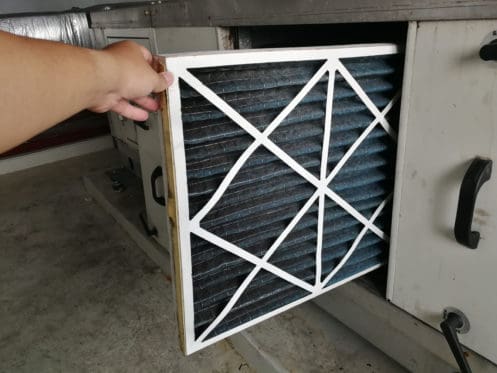Over time, as your household HVAC system runs to keep you and your family comfortable, its air filters will be consistently catching contaminants. Those filters only have so much space, though, meaning that eventually, they’re going to become clogged with things like dust, dirt, pollen, and small debris. When those filters get obstructed or overly dirty, they can have a variety of negative effects on your home. For one thing, it will be much more difficult for your heating and cooling systems to circulate air. Your HVAC unit’s overall performance and efficiency will suffer, and the risk of mechanical failure will increase as well. That said, if you make a point to replace your HVAC air filters before they get too dirty, you can avoid those discomforts and frustrations.
So, how often do those air filters need to be switched out? In truth, there are basic guidelines, but the specific timeframe depends on multiple variables.
Consider the Type of Air Filter
When you’re figuring out how long your air filters can last, the first thing to consider is which specific type of filter your household uses. Generally, there are two primary types of filters to choose from. The higher quality option tends to be pleated air filters, which are somewhat expensive but are also extremely effective at trapping contaminant particles. On average, pleated filters can remain in use for up to around 90 days. Alternatively, your home may use fiberglass filters. Fiberglass filters are also effective, but they aren’t quite as efficient at catching particles as pleated filters are. They should also typically be used for only about 30 days before being replaced. However, they are significantly more affordable than their pleated counterparts.
While these timeframes do represent the average lifespans of the two types of filters, they don’t take into account the specifics of your household’s situation. Ideally, you should start with the 30- or 90-day figure, then adjust it based on multiple factors.
Who Lives in Your Home?
One variable that can have a significant impact on your air filters is the occupancy of your household. As a general guideline, the more people there are living in your home, the more frequently you’ll need to replace your filters. This is primarily because typically, more people sharing a home will result in the heating and cooling systems being needed more often. For example, if it’s only you or you and one other person, there will probably be regular periods when no one is at home and running the HVAC system. However, if there are four or five of you living together, the summers and winters will probably see the appliances being depended on for many hours each day.
It’s also worth considering the specifics of who lives in your home. Typically, young children are more sensitive to pollutants in the air than grown adults. And when your filters get clogged, it leads directly to more pollen, dust mites, mold spores, and other irritants floating around the household. So, if any kids are living in your home, it’d be wise to change your air filters a bit more regularly in the interest of keeping them healthy.
What Size Is Your House?
You should also consider the size of your home when considering the life expectancy of your HVAC air filters. If you have a large, spacious house, your heating and cooling systems are going to need to circulate considerably more air to maintain a comfortable, consistent climate. Longer operation time and more air circulation mean more contaminants getting caught in the air filters, meaning the filters will get dirty more quickly and need to be replaced sooner.
On the other hand, if you have a relatively small dwelling, your HVAC air filters may be able to last significantly longer before they become packed with particles. However, it’s important to note that in some smaller homes, there are also smaller appliances with smaller air filters. In those cases, the filters will likely become clogged just as quickly as they would in a larger house, so you’ll want to verify the sizes in your home.
Do You Have Household Pets?
As any long-time pet owner can probably attest, having pets in your home can lead to many more dander particles and hairs floating around the air. Many of those hairs and particles will inevitably end up being caught in your HVAC air filters, taking up space and speeding up the process of the filters getting clogged. And the more pets you have, the greater the effect on your home’s air filters will be. Additionally, if you have dogs or any other pets that spend time outdoors, there’s a high probability that they’ll regularly be tracking things like dirt, pollen, and mold spores into your house. So, it’s important to consider your household pet situation when you’re determining how often to replace your air filters.
What Time of Year Is It?
In the greater Charleston, SC area, there will likely be certain seasons in which your air filters need to be changed more frequently than others. Typically, the weather in the summer and winter months will be significantly harsher than during spring and autumn, meaning your HVAC system will probably be relied upon much more heavily. Since heavy usage of your HVAC appliances means more work for your air filters, it stands to reason that those filters will have shorter lifespans during the hottest and coldest times of the year.
That said, summer and winter may not be the only times when your HVAC filters get dirty rather quickly. Although the temperatures are often mild during spring, there also tends to be quite a bit of pollen floating around the air. Inevitably, some of that pollen will get cycled into your home and end up trapped in your air filters. So, make sure you’re considering the current season and weather when deciding how often to switch out your home’s HVAC filters.
How Do the Filters Look?
Once you’ve nailed down a routine for replacing your air filters, you will probably figure out the ideal timeframe to follow. However, getting to that point may require some trial and error for the first year or several months. During that phase, you can always lean on visual inspections to make sure you’re making the right choices. Typically, you can get a pretty good idea of whether your HVAC filters need to be changed or not by simply holding them up to a light source. If you can see the light pass through the filter, you’re probably safe to continue using it. However, if the light can’t get through, it means that you should switch the filter out for a new, clean one.
Dependable HVAC Experts
If you need quality heating, air conditioning, plumbing, or electrical services in the greater Charleston area, our team at Charleston Heating and Air is always available to assist you. We’ve been proudly serving this area since 2009, and just like our slogan says, we care about your comfort. We offer a variety of reliable services, ranging from tankless water heater installation to furnace maintenance and air conditioner installation. If you’d like to make an appointment or learn more about our services, give us a call today!

